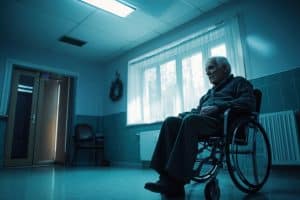How to Report Elder Abuse in Kentucky
 According to the state’s Legislative Research Commission, over 20% of Kentucky’s population was over 60 in 2014, and that number will increase to over 25% by 2030. In other words, seniors are one of Kentucky’s fastest-growing demographic groups. Additionally, over 20,000 people, most of them seniors, live in nursing homes. As the number of elderly grows, so will the opportunities for elder abuse.
According to the state’s Legislative Research Commission, over 20% of Kentucky’s population was over 60 in 2014, and that number will increase to over 25% by 2030. In other words, seniors are one of Kentucky’s fastest-growing demographic groups. Additionally, over 20,000 people, most of them seniors, live in nursing homes. As the number of elderly grows, so will the opportunities for elder abuse.
The Kentucky state government reports that in 2020, there were 23,766 reports alleging elder abuse. This number, unfortunately, has been increasing in recent years. Although the state has built a strong legal framework for the protection of the elderly, it requires your cooperation to operate effectively.
How to recognize elder abuse
Elder abuse comes in six different forms—physical, emotional, sexual, financial, neglect and abandonment. Abuse can be difficult to detect because abusers tend to isolate their victims, and because victims are sometimes hesitant to report abuse or to even admit to witnessing it when questioned by others. Due to underreporting or isolation, you might have to discover abuse by looking at external signs of abuse such as:
- Unexplained injuries: If your loved one lives in a nursing home, bedsores are a sign of nursing home neglect. Bruises might indicate physical abuse, and abrasions on the wrists or ankles might suggest inappropriate restraints.
- Sudden behavioral changes: Moodiness, withdrawal from social interaction and increased anxiety when certain people are present are indicators of abuse.
- Poor hygiene or malnutrition: Poor hygiene indicates neglect if the victim is unable to bathe or wash themselves. Weight loss, dehydration, dirty clothing, untreated medical problems or a generally unkempt appearance suggest neglect.
- Unsanitary living conditions: Dirty bedding, unsafe living arrangements, or pest infestations may be signs of neglect or abandonment.
- Unusual financial activity: Unexplained withdrawals from the victim’s bank account, a missing ATM card, changes in insurance beneficiaries, missing possessions (jewelry, for example), or unpaid bills could be signs of financial exploitation.
- Anxiety in the presence of a caregiver: The victim may appear nervous around a caregiver, or they might defer answers to all questions to their caregiver.
- STDs or genital injuries: STDs in particular are likely to indicate sexual abuse. This is particularly likely if the victim is unable to consent to sexual relations (a dementia victim, for example). Genital injuries can indicate non-consensual sexual relations, since consensual activity is less likely to result in injury.
By carefully observing unexplained changes in physical condition, behavior, finances, or living circumstances, you can uncover the critical red flags of potential elder abuse.
Kentucky’s mandatory reporting statute
All states impose elder abuse reporting obligations on certain people, such as health care providers. Some of these states impose reporting obligations on anyone who is in a position to know of elder abuse, even neighbors and friends. Kentucky is one of the latter states. Kentucky’s mandatory elder abuse reporting statute, KRS §209.030, imposes reporting obligations on any person suspecting elder abuse.
How to report elder abuse
Every state’s system for reporting elder abuse differs from every other, and Kentucky is no exception. Here is a list of who to call under what circumstances in Kentucky:
- In an emergency, call 911. This applies if the elder is in immediate danger, requires urgent medical attention, or if there’s a crime in progress.
- In a non-emergency where you suspect abuse, neglect, or exploitation of an adult, contact Adult Protective Services (APS). You can call them at 877-597-2331. You can also call the Cabinet for Health and Family Services Hotline, which is the primary intake for APS, at 800-752-6200.
- If the suspected abuse occurs in a nursing home or other long-term care facility, you should also call the Nursing Home Hotline at 1-800-810-1819 to trigger a state investigation.
- For issues within a nursing home or assisted living facility where you need an advocate or have concerns about resident rights (which can include abuse/neglect), contact the Long-Term Care Ombudsman Program
You can call two or more of the above-listed parties if appropriate under the circumstances.
Required information for effective reporting
Provide as much of the following information as you have access to:
- The victim’s full name, current address, approximate age, date of birth, and medical condition. If the victim suffers from dementia, include that information.
- Identifying details of the perpetrator including name, address, relationship to the victim, and how they gain access to the victim (because they work for a nursing home, for example).
- A description of the abuse. Be as specific as possible.
- Where and when the incidents of abuse occurred.
- Specify any urgent needs, and state whether the victim is in any immediate danger.
- State how you learned about the abuse—direct observation, conversation with the victim, etc.
- Provide the names and contact details of any witnesses to the abuse.
- Offer any evidence of abuse you may have access to.
- Provide your name and contact details. It’s OK if you wish to report anonymously because you fear retaliation.
It’s OK if you don’t know everything–just report what you know. You will not be blamed for any inaccuracies as long as you made your report in good faith (honest intentions).
After you file your report
After you file your report, it would be helpful if you would cooperate with service providers and law enforcement. Cooperation does not have to compromise your confidentiality.
The role of a personal injury lawyer
Contacting the authorities is how you stop the abuse. Even after the abuse stops, however, the victim deserves compensation for the harm they have suffered. That is where the services of a personal injury lawyer can come in handy. Your loved one deserves full compensation for all of the harm they endured, including their pain and suffering.
Even if the victim died from the abuse, the victim’s estate executor can file a wrongful death lawsuit. If the victim died for reasons unrelated to the abuse, the executor can still file a survival action against the perpetrator.
Act now to secure justice for your loved one
If you suspect that your loved one is suffering from elder abuse–whether in an assisted living facility or at home-–now is not the time to delay. Act quickly to protect your loved one.
Garcia & Coman is a nationwide elder abuse law firm that has successfully handled thousands of cases. And by “successfully”, we mean that our clients have brought home over $3 billion in compensation. We maintain six offices in various locations throughout the United States, including Louisville, Kentucky. Contact us as soon as you can to schedule a free initial consultation where we can explore your options.

Stephen M. Garcia represents victims of elder and nursing home abuse and is known as one of the leading civil litigators in the country. He is Senior Partner at Garcia & Coman, where the firm’s practice is focused on elder abuse, nursing home abuse, and wrongful death of the elderly.
Find out more about Stephen M. Garcia

